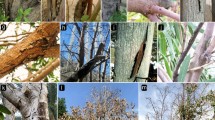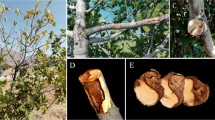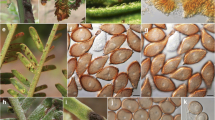Abstract
Daylily (Hemerocallis spp) rust caused by Puccinia hemerocallidis is a common disease that has become a global problem. This study identified and characterized the causal agent of daylily rust in east China. Based on the internal transcribed spacer (ITS) sequences, a phylogenetic tree of the P. hemerocallidis from China and other geographical regions was constructed, and the result showed that P. hemerocallidis from daylilies in east China grouped with other P. hemerocallidis isolates collected from North-, Central-American and Europe. In addition, the effects of incubation condition, temperature, and light on urediniospores germination were investigated in vitro. The results showed that the P. hemerocallidis urediniospores could germinate at 10–40 ℃ under light intensity of 10–100 Klux, but they hardly germinated at 5 ℃. W-WA medium (water agar medium covered with sterile water) was the most suitable in vitro germination substrate, combined with the temperature of 20–30 ℃ and light intensity of 40–70 Klux. The results of this study provided a basis for understanding the biology of the causal agent of daylily rust disease.






Similar content being viewed by others
References
Alaei H, De Backer M, Nuytinck J, Maes M, Höfte M, Heungens K (2009) Phylogenetic relationships of Puccinia horiana and other rust pathogens of Chrysanthemum × morifolium based on rDNA ITS sequence analysis. Mycol Res 113(6–7):668–683. https://doi.org/10.1016/j.mycres.2009.02.003
Bai QR, Han S, Xie YY, Dong R, Gao J, Li Y (2012) First report of daylily leaf streak caused by Kabatiella microsticta in China. Plant Dis 96(10):1579. https://doi.org/10.1094/PDIS-04-12-0381-PDN
Bolton MD, Kolmer JA, Garvin DF (2008) Wheat leaf rust caused by Puccinia triticina. Mol Plant Pathol 9(5):563–575. https://doi.org/10.1111/j.1364-3703.2008.00487.x
Bor JY, Chen HY, Yen GC (2006) Evaluation of antioxidant activity and inhibitory effect on nitric oxide production of some common vegetables. J Agric Food Chem 54(5):1680–1686. https://doi.org/10.1021/jf0527448
Buck JW, Williams-Woodward JL (2003) The effect of fungicides on urediniospore germination and disease development of daylily rust. Crop Prot 22(1):135–140. https://doi.org/10.1016/S0261-2194(02)00123-0
Buck JW, Dong WB, Mueller DS (2010) Effect of light exposure on in vitro germination and germ tube growth of eight species of rust fungi. Mycologia 102(5):1134–1140. https://doi.org/10.3852/09-283
Chatasiri S, Kitade O, Ono Y (2006) Phylogenetic relationships among Puccinia hemerocallidis, p. funkiae, and P. patriniae (uredinales) inferred from its sequence data. Mycoscience 47(3):123–129. https://doi.org/10.1007/S10267-006-0283-Y
Dong W, Buck JW (2011) Effect of light on in vivo urediniospore germination, lesion development and sporulation of Puccinia hemerocallidis on daylily and Puccinia pelargoniizonalis on geranium. Mycologia 103(6):1277–1283. https://doi.org/10.3852/11-047
Dong WB, Jeffers SN, Buck JW (2013) Management of daylily rust with different fungicides and application methods. Plant Dis 97(7):921–926. https://doi.org/10.1094/PDIS-12-12-1127-RE
Gardes M, Bruns TD (1993) ITS primers with enhanced specificity for basidiomycetes–application to the identification of mycorrhizae and rusts. Mol Ecol 2(2):113–118. https://doi.org/10.1111/j.1365-294x.1993.tb00005.x
Grisham MP, Hoy JW, Haudenshield JS, Hartman GL (2013) First report of orange rust caused by Puccinia kuehnii in sugarcane in Louisiana. Plant Dis 97(3):426. https://doi.org/10.1094/PDIS-09-12-0873-PDN
Hernández JR, Palm ME, Castlebury LA (2002) Puccinia hemerocallidis, cause of daylily rust, a newly introduced disease in the Americas. Plant Dis 86(11):1194–1198. https://doi.org/10.1094/PDIS.2002.86.11.1194
Hiratsuka N, Sato T, Katsuya K, Kakishima M, Hiratsuka Y, Kaneko S, Ono Y, Sato S, Harada Y, Hiratsuka T, Nakayama K (1992) The Rust Flora of Japan. Tsukuba Shuppankai, Ibaraki, Japan. pp: 710–711
Inokuti EM, Soares DJ, Barreto RW (2012) Epidemic spread of Puccinia hemerocallidis in Brazil. Australas. Plant Dis Notes 7(1):7–8. https://doi.org/10.1007/s13314-011-0033-7
Lei FC, Liu HM, Yang GX (2010) The regularity and control of rust in Hemerocallis citrina Baroni. Guangdong Agricultural Sciences 37(05):102–103. https://doi.org/10.16768/j.issn.1004-874x.2010.05.062. In Chinese
Li YH, Windham MT, Trigiano RN, Fare DC, Spiers JM, Copes WE (2007) Microscopic and macroscopic studies of the development of Puccinia hemerocallidis in resistant and susceptible daylily cultivars. Plant Dis 91(6):664–668. https://doi.org/10.1094/PDIS-91-6-0664
Li YH, Trigiano RN, Windham MT, Vito LM, Fare DC, Spiers JM (2009) Inhibition of urediniospore germination in Puccinia hemerocallidis by Bacto Agar and changes in percent germination and germ-tube elongation on agarose over time. Can J Plant Pathol 31(2):163–168. https://doi.org/10.1080/07060660909507589
Lin YL, Lu CK, Huang YJ, Chen HJ (2011) Antioxidative caffeoylquinic acids and flavonoids from Hemerocallis fulva flowers. J Agric Food Chem 59(16):8789–8795. https://doi.org/10.1021/jf201166b
Ma X, Liu Y, Li Q, Tian X, Du Z, Kang Z, Zhao J (2020) Identification of Berberis spp. as alternate hosts for Puccinia achnatheri-sibirici under controlled conditions and morphologic observations of sexual stage development of the rust fungus. Front Microbiol 11:1278. https://doi.org/10.3389/fmicb.2020.01278
Mims CW, Rodriguez-Lother C, Richardson EA (2002) Ultrastructure of the host-pathogen interface in daylily leaves infected by the rust fungus Puccinia hemerocallidis. Protoplasma 219(3–4):221–226. https://doi.org/10.1007/s007090200023
Mostert L, Bester W, Coertze S, Wood AR (2008) First report of daylily rust caused by Puccinia hemerocallidis in the western Cape province of south Africa. Plant Dis 92(7):1133. https://doi.org/10.1094/PDIS-92-7-1133A
Mueller DS, Buck JW (2003) Effects of light, temperature, and leaf wetness duration on daylily rust. Plant Dis 87(4):442–445. https://doi.org/10.1094/PDIS.2003.87.4.442
Mueller DS, Williams-Woodward JL, Buck JW (2003) Resistance of daylily cultivars to the daylily rust pathogen, Puccinia hemerocallidis. HortScience 38(6):1137–1140. https://doi.org/10.21273/HORTSCI.38.6.1137
Mueller DS, Jeffers SN, Buck JW (2004) Effect of timing of fungicide applications on development of rusts on daylily, geranium, and sunflower. Plant Dis 88(6):657–661. https://doi.org/10.1094/PDIS.2004.88.6.657
Ramos M, Carvalho R, Soares da Silva E, Ramos AP, Talhinhas P (2020) Pathological and epidemiological characterization of first outbreak of daylily rust in europe and evaluation of Puccinia hemerocallidis resistance in Hemerocallis cultivars. Plants (Basel Switzerland) 9(4):427. https://doi.org/10.3390/plants9040427
Ribeiro RS, Casa RT, Kretzschmar AA, Bampi D, Silveira FN, E Fossá (2014) Fungitoxic action of fungicides on the germination of Puccinia hemerocallidis urediniospores. Rev Cienc Agrovet 110(11):1194–1203. https://doi.org/10.1161/CIRCRESAHA.107.159053
Rochi L, Diéguez MJ, Burguener G, Darino MA, Pergolesi MF, Ingala LR, Cuyeu AR, Turjanski A, Kreff ED, Sacco F (2018) Characterization and comparative analysis of the genome of Puccinia sorghi Schwein, the causal agent of maize common rust. Fungal Genet Biol 112:31–39. https://doi.org/10.1016/j.fgb.2016.10.001
Rodriguez-Enriquez MJ, Grant-Downton RT (2013a) A new day dawning: Hemerocallis (daylily) as a future model organism. AoB Plants 5(0):pls055. https://doi.org/10.1093/aobpla/pls055
Rodriguez-Enriquez MJ, Grant-Downton RT (2013b) A new day dawning: Hemerocallis (daylily) as a future model organism. AoB Plants 5:pls055. https://doi.org/10.1093/aobpla/pls055
Sandoval-Sánchez M, Nava-Díaz C, Pérez-Cárcamo J, Sandoval-Islas JS (2019) Identification of daylily rust (Puccinia hemerocallidis) and characterization of resistance of five genotypes. Rev Mex Fitopatol 38(1):1–15. https://doi.org/10.18781/R.MEX.FIT.1910-3
Schnabel G, Bussey KE, Bryson PK (2005) First report of Armillaria gallica causing Armillaria root rot in daylily in South Carolina. Plant Dis 89(6):683. https://doi.org/10.1094/PD-89-0683A. PMID: 30795400
Silva E, Carvalho R, Nunes N, Ramos AP, Talhinhas P (2016) First report of Puccinia hemerocallidis causing daylily rust in Europe. Plant Dis 100(10):2163. https://doi.org/10.1094/PDIS-02-16-0242-PDN
Subrahmanyam P, Reddy PM, Mcdonald D (1988) Photosensitivity of urediniospore germination in Puccinia arachidis. Trans Br Mycol Soc 90(2):229–232. https://doi.org/10.1016/S0007-1536(88)80094-9
Tan XY, Ma YH, Li C, Wang LY (2021) Investigation on the incidence of daylily leaf rust and its control measures. China Cucurbits and Vegetables 34(05):101–104 In Chinese. https://doi.org/10.16861/j.cnki.zggc.2021.0124
Tapsoba H, Wilson JP (1997) Effects of temperature and light on germination of urediniospores of the pearl millet rust pathogen, Puccinia substriata var. Indica. Plant Dis 81(9):1049–1052. https://doi.org/10.1094/PDIS.1997.81.9.1049
Tian SB, Zhu WM, Zhu LY, Yang YY, Zhang H, Liu N (2020) Identification of pathogen from Corynespora leaf spot of tomato and research on its biological characteristics. Plant Protection 46(03): 157–162 + 166. In Chinese. https://doi.org/10.16688/j.zwbh.2019091
Vieira W, Michereff SJ, Oliveira AC, Santos A, Câmara M (2014) First report of anthracnose caused by Colletotrichum spaethianum on Hemerocallis flava in Brazil. Plant Dis 98(7):997. https://doi.org/10.1094/PDIS-10-13-1026-PDN
Virtudazo EV, Nakamura H, Kakishima M (2001) Phylogenetic analysis of sugarcane rusts based on sequences of ITS, 5.8 S rDNA and D1/D2 regions of LSU rDNA. J Gen Plant Pathol 67(1):28–36. https://doi.org/10.1007/PL00012983
Williams-Woodward JL, Hennen JF, Parda KW, Fowler JM (2001) First report of daylily rust in the United States. Plant Dis 85(10):1121. https://doi.org/10.1094/PDIS.2001.85.10.1121C
Xu SC, Wang ZX (1985) Preliminary report of Yellow Flower rust prevention and control test. China Vegetables (03):46–48. In Chinese
Zhang LJ, Zhou LL, Xu X, Meng JL, Wu SJ, Tian FF (2019) Research progress of rust in the Hemerocallis citrina Baroni. Journal of Northern Agriculture 47(04):81–86. In Chinese. https://doi.org/10.3969/j.issn.2096-1197.2019.04.14
Acknowledgements
This study was supported by Shanghai Science and Technology Project (23010504800), the National Natureal Science Foundation of China (No.32201607) and Shanghai Science and Technology Agriculture Project (No. 2019-02-08-00-08-F01107), China.
Author information
Authors and Affiliations
Contributions
ML was responsible for the guidance of experiments and the revision of manuscript. QQ was responsible for designing and performing of experiments, and carrying out data analysis. DH, QQ and MF were responsible for writing manuscript and the culture of experimental samples.
Corresponding authors
Ethics declarations
Conflict of interest
The authors declare that there are no conflict of interest.
Additional information
Publisher’s Note
Springer Nature remains neutral with regard to jurisdictional claims in published maps and institutional affiliations.
Qiaoping Qin and Dongmei Huang Contributed equally to this work.
Rights and permissions
Springer Nature or its licensor (e.g. a society or other partner) holds exclusive rights to this article under a publishing agreement with the author(s) or other rightsholder(s); author self-archiving of the accepted manuscript version of this article is solely governed by the terms of such publishing agreement and applicable law.
About this article
Cite this article
Qin, Q., Huang, D., Li, M. et al. Environmental conditions affecting the germination of Puccinia hemerocallidis urediniospores. J Plant Pathol 105, 963–971 (2023). https://doi.org/10.1007/s42161-023-01414-0
Received:
Accepted:
Published:
Issue Date:
DOI: https://doi.org/10.1007/s42161-023-01414-0




